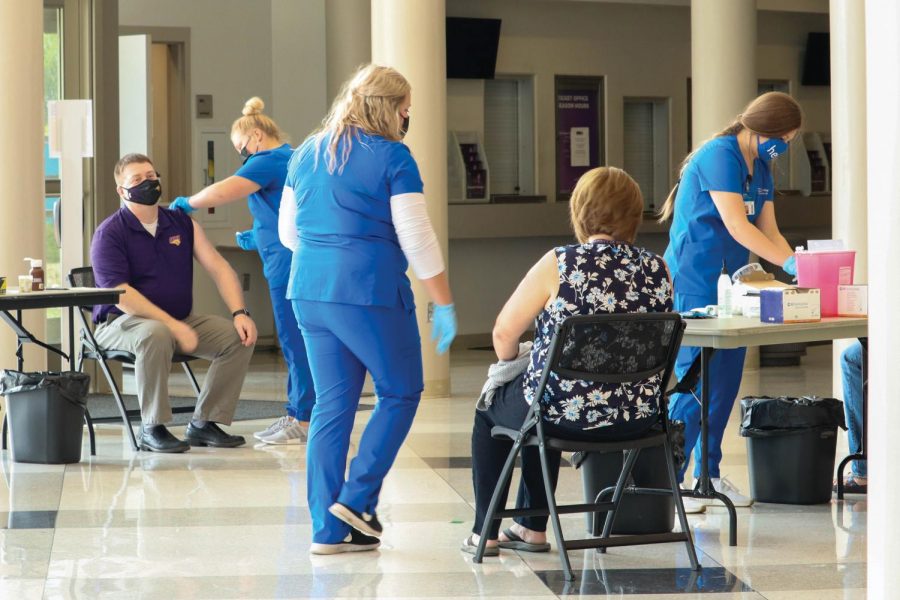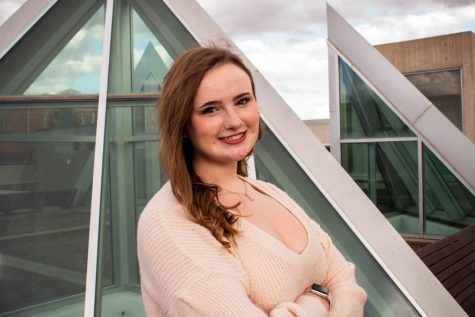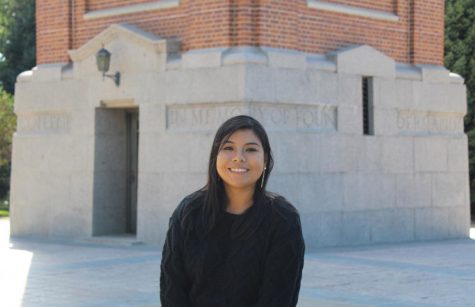Flu vs COVID-19: professors weigh in
The UNI Student Health Clinic hosts a walk-in flu shot clinic on Tuesday, Sept 15 in GBPAC. Flu shot clinics will continue for the next month as the clinic prepares to navigate flu season amidst the ongoing COVID-19 pandemic.
Sep 21, 2020
As the weather begins to change towards the cold winter ahead, one word that’s all too familiar comes to most minds: influenza.
The CDC reports that 12,000-61,000 people have died from influenza, commonly known as “the flu,” annually since 2010. Most experts agree the season begins in the fall and can last until early spring.
With the COVID-19 pandemic still very much alive, several UNI biology professors discussed both viruses and the impact they may have on each other.
Dr. Nilda Rodriguez, associate professor of microbiology at UNI, compared the flu and COVID-19 on a molecular and symptomatic level.
“Receptors work with a lock and key,” she said. “So, the flu has a particular lock and key combination in our cells, and coronavirus has a different lock and key, but it is suggested that the coronavirus may have access to several receptors.”
She added that many people do not understand that COVID-19 affects not only the lungs, but also other organs such as the kidneys, heart and brain.
“That’s why somehow these patients are experiencing all of this array of symptoms that can range way worse than the flu,” she said.
Dr. Michael Walter, associate professor of biology, said that since the flu has a seasonal cycle, it is more easily tracked than coronaviruses.
“Since we have so much experience with flu, we actually have a system in place to produce vaccines for each subtype of flu that comes out each year,” he said. “Flu is pretty predictable, still very dangerous, but coronavirus groups don’t seem to have locked into that cycle yet.”
Dr. David McClenahan, associate professor of biology, expressed a similar sentiment, especially in terms of vaccines.
“A lot of the concern with developing a vaccine is even if we do come up with a vaccine soon, will it be protective down the road soon?” he said, noting that the virus which causes COVID-19 could mutate.
Rodriguez noted that another caveat in the search for a vaccine is the timetable.
“Things are not immediate,” she said. “You get into the lab, you have to do the experiment, you make the vaccination, but you have to allow the immune response to kick in and then measure it over time. Sometimes people think it’s just a matter of if you work harder or faster it will be done sooner, like if you’re a good farmer, you will make the corn in half the time. You cannot.”
However, the coronavirus pandemic could offer some positives in the annual fight against the flu, both in terms of preventative public safety measures and vaccine awareness.
“People are more aware of vaccines… and many of the same precautions we’re taking for COVID should help reduce the likelihood of getting influenza,” McClenahan said. “I think this is going to change how we approach infectious disease. Hopefully, it’ll be to the benefit of the general public where we’ll have a quicker response, hospitals will be a little more prepared for these types of diseases and such.”
In order to enjoy these positive results, however, the professors agreed that the public must continue to follow COVID-19 guidelines.
“The problem is that this is not something like driving without your seatbelt,” Rodriguez said. “You have an accident, well, bad luck for you, but your next-door neighbor, or your family members, will not get affected by your choice. This is different, because it gets into the community, and it gets spread to a second person, a third person, and it will affect a whole lot of people and it will affect them really badly.”
Walter agreed, urging students to follow UNI and CDC policies by wearing masks, washing hands and avoiding large groups.
“Try to behave yourselves,” he said.
Shelley O’Connell, executive director of health and recreation services, stated in an email that the Student Health Clinic is prepared to take on both COVID-19 and influenza this upcoming winter season.
“We have a separate entrance for students who are experiencing any of these symptoms such as a fever, cough, sore throat, headache, body aches, congestion or runny nose which are both associated with influenza as well as COVID-19,” she wrote. “We are all in this together and need to do our part to protect our Panthers and our campus safe and healthy.”
In preparation for the flu season, the Student Health Clinic is hosting walk-in flu shot clinics at the Gallagher Bluedorn Performing Arts Center (GBPAC) between Sept. 15 and Oct. 7. There is no charge for the flu vaccine this year. For a list of dates and times, visit health.uni.edu.
















